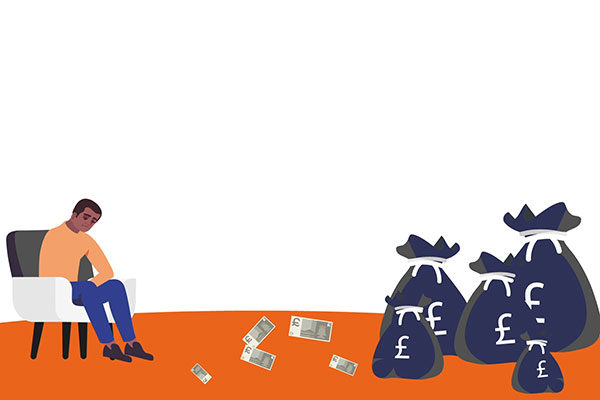Find out your financial personality type
12th July 2021 13:31
by Harriet Meyer from interactive investor
To make the right financial decisions and understand where you might be going wrong, understanding your own financial personality is essential. Check out the following types, and how you can work towards becoming a more successful saver and investor.
Are you a Fitbit Financier, Anxious Investor or Hoarder? Just as we all have different personalities, we take a personal approach to managing our money, too.
Perhaps you’re someone who obsessively keeps tabs on your investments, just like an athlete might monitor their personal best, and eating habits. Or, you might be more likely to bury your head in the sand and consistently fail to take financial action, limiting your money’s potential.
Of course, your financial personality type may change, depending on your priorities and life stage, but whatever your current tendencies, they are likely to be driving your wealth prospects. Check out the following types, and how you can work towards becoming a more successful saver and investor.
- Explore our Mind & Money podcasts and find out more how our minds affect investment decisions
- Want to learn more about the world of investing? Visit our Knowledge Centre
Fitbit Financier
As the name suggests, you monitor your finances and market movements as much as a gym addict might check their fitbit data. And with account balances and investment performance readily available within seconds online and on our smartphones, it’s easy to do if you’re this way inclined. Chances are, you’re a spreadsheet addict and budgeting champion to boot.
“A lot of people have an action bias,” explains Greg Davies, head of behavioural finance at Oxford Risk. “So they feel in control of their finances if they’re frequently monitoring their money.”
But when it comes to investing, seeking control can be dangerous, warns Davies. “After all, market performance is usually random over the short term.” Keeping an eye on your finances is sensible, but take a step back and try to reduce your consumption of financial information. After all, investing for the long term shouldn’t eat up large chunks of your time.

The Ostrich
Like an ostrich, you put your head in the sand and avoid making long-term financial decisions. You choose, instead, to live for today and fail to tackle your financial well-being and security. You may pay into a pension, but it’s probably at a minimum level without an understanding of how much you need to ultimately build for a comfortable retirement.
You go through life without a sense of financial planning for the future – which, in turn, increases your chances of having to work longer than necessary. That’s unless you’ve got a large income or come into money later in life that means you don’t have to worry.
“Ostriches are typically fearful and indecisive, and feel powerless – but may be happy-go-lucky on the outside,” says Fanny Snaith, a money coach. “But they can be transformed with education about money.” She suggests taking your head out of the sand and resolving to learn about your long-term financial needs to look after your future self.
- Find out more about our QuickStart funds to help you start investing: ii.co.uk/quick-start-funds
- Examine the pension savings habits of investors at different life stages
The Anxious investor
Perhaps you’ve taken action and invested but suffer frequent bouts of anxiety when the market takes a tumble. You might even have experience of selling your investments when the stock market has crashed in the past, only serving to crystallise losses.
Investing in the stock market can be nerve-wracking, but history shows that they typically recover and you’ll benefit from gains given enough time. So, how can you stop being over-anxious, which is a common trait among many investors, and build financial resilience?
“It’s important to focus on the destination - so, your ultimate goals - and develop less emotional engagement with the present,” says Davies. “This will help you be calmer, and a more successful investor.”

The Hoarder
As a ‘hoarder’, you stick to cash – but this can be recklessly cautious. “You may be hoarding from an underlying lack of trust, with past events making you fearful of losing your cash,” says Snaith. “I’ve had clients with over £1 million sitting in bank accounts paying no interest!”
But by sitting in cash, you’re locking in the negative impact of inflation without the chance to benefit from future stock market gains. “It’s important to gain knowledge about the impact of this, and how compound interest works in investing,” adds Snaith.
While it’s sensible to have a cash safety net of around three to six months’ worth of expenditure, once you’ve got this in place, you can take some risk with the rest. There are plenty of ready-made investment portfolios, for example, across different risk profiles on offer that are already well diversified. So, you can rest assured that you’re planning for your future, and giving your money the chance to grow and beat inflation.
These articles are provided for information purposes only. Occasionally, an opinion about whether to buy or sell a specific investment may be provided by third parties. The content is not intended to be a personal recommendation to buy or sell any financial instrument or product, or to adopt any investment strategy as it is not provided based on an assessment of your investing knowledge and experience, your financial situation or your investment objectives. The value of your investments, and the income derived from them, may go down as well as up. You may not get back all the money that you invest. The investments referred to in this article may not be suitable for all investors, and if in doubt, an investor should seek advice from a qualified investment adviser.
Full performance can be found on the company or index summary page on the interactive investor website. Simply click on the company's or index name highlighted in the article.